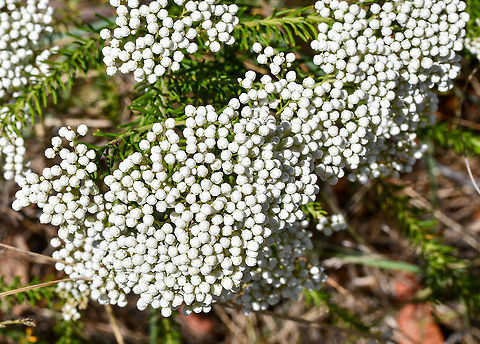
Appearance
''Ozothamnus diosmifolius'' is an erect, much-branched, woody shrub which usually grows to a height of 2 m but sometimes much taller. Its branches are rough and densely covered with short hairs. The leaves are sharp-smelling, usually 10–15 mm long and 1–2 mm wide but inland forms have leaves to 3.5 mm wide. As with other plants in the family Asteraceae, each "flower" is actually a head of flowers, each 2–3 mm in diameter. In this species, the "flowers" are themselves arranged in corymbs, the corymbs in branching heads containing from a few to hundreds of individual "flowers". The white or pinkish coloration is due to the papery ray florets around individual "flowers".Naming
Rice flower was first formally described in 1804 by Étienne Pierre Ventenat who gave it the name ''Gnaphalium diosmifolium'' and published the description in ''Jardin de la Malmaison''. In 1838, Augustin Pyramus de Candolle changed the name to ''Ozothamnus diosmifolius''. The specific epithet is a reference to the similarity of the leaves of this species and those of ''Diosma''. The common names "rice flower" and "sago bush" refer to the appearance of the flowers in bud.Distribution
''Ozothamnus diosmifolius'' is widespread on the coast, tablelands and western slopes of New South Wales and Queensland north from Eden to Wide Bay. It grows in heath and on rainforest margins, often on ridges.Habitat
''Ozothamnus diosmifolius'' is widespread on the coast, tablelands and western slopes of New South Wales and Queensland north from Eden to Wide Bay. It grows in heath and on rainforest margins, often on ridges.The time of day of pollen release is different from that of stigma exposure, increasing the chances of cross-pollination.References:
Some text fragments are auto parsed from Wikipedia.